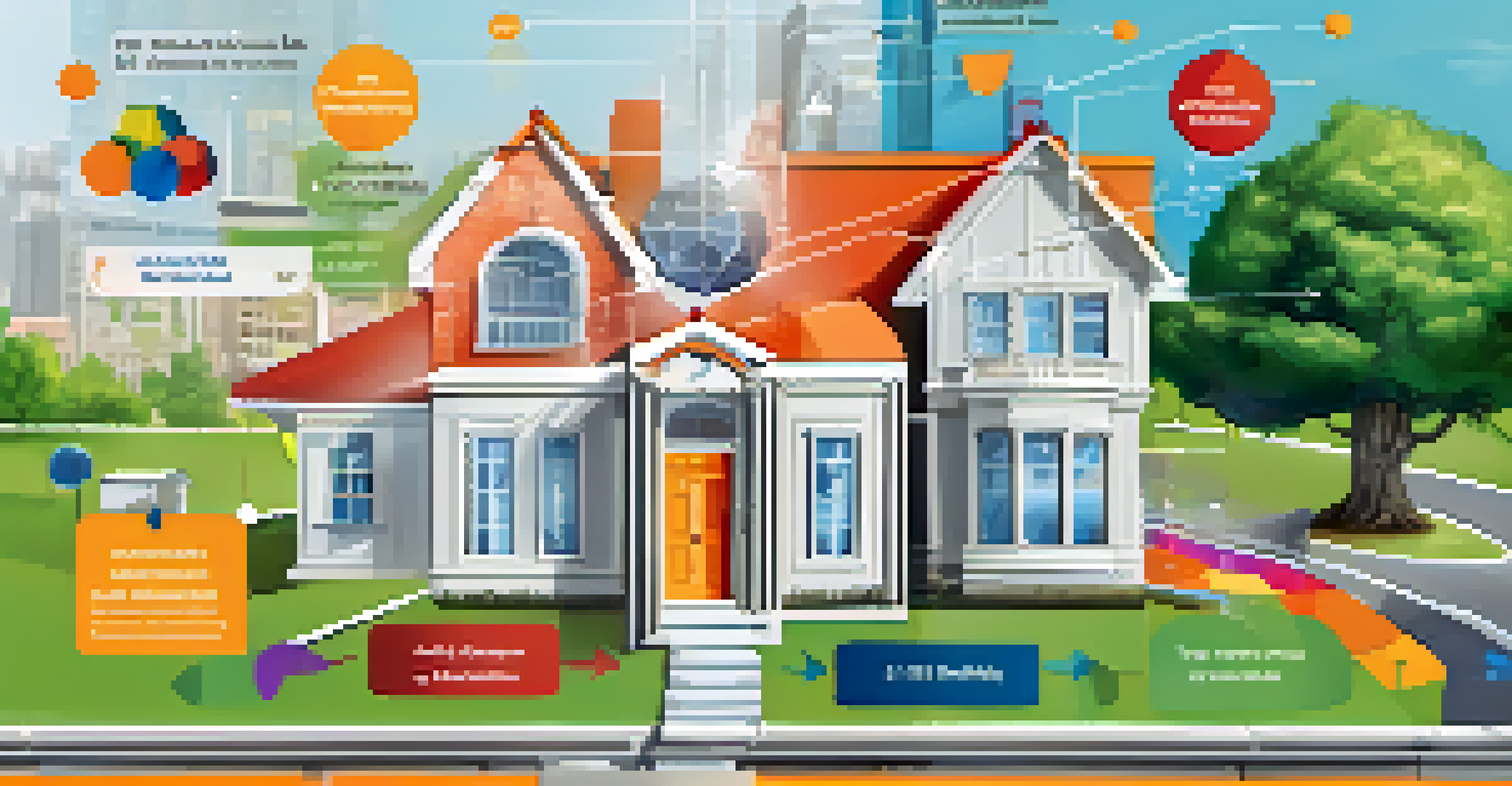How Blockchain Can Combat Real Estate Fraud Effectively

Understanding Real Estate Fraud and Its Impact
Real estate fraud is a serious issue that can affect buyers, sellers, and investors alike. It often involves deceitful practices such as title fraud, mortgage fraud, and misrepresentation of property details. The financial implications can be devastating, leading to loss of money and trust in the system.
The blockchain is not just a technology; it’s a new way of thinking about trust.
This type of fraud not only affects individuals but can also shake the foundation of the real estate market. When people lose confidence in transactions, it can lead to decreased property values and a slowdown in market activity. Consequently, addressing this issue is crucial for maintaining a healthy real estate landscape.
With the rise of technology, new solutions are emerging to combat fraud effectively. One such solution is blockchain technology, which promises to enhance transparency and security in real estate transactions.
What Is Blockchain and How Does It Work?
At its core, blockchain is a decentralized digital ledger that records transactions across multiple computers. This technology ensures that the data cannot be altered retroactively without altering all subsequent blocks, making it incredibly secure. Each transaction, or 'block,' is linked to the previous one, creating a 'chain' of information.

The decentralized nature of blockchain means that no single entity has control over the entire database. This characteristic reduces the risk of tampering and fraud, as any changes would require consensus from all network participants. Imagine a community ledger where everyone has a copy; if someone tries to change their entry, everyone's copy would immediately reveal the discrepancy.
Real Estate Fraud Threatens Trust
Real estate fraud undermines confidence among buyers and sellers, leading to financial losses and market instability.
This transparency and security are precisely what real estate transactions need. By utilizing blockchain, parties involved can trust that the information is accurate and immutable.
Enhancing Transparency in Property Ownership
One of the most significant advantages of blockchain in real estate is its ability to provide transparent ownership records. Traditional property records can be convoluted and difficult to verify, often leading to disputes over ownership. Blockchain simplifies this process by ensuring that every transaction is recorded and easily accessible.
Fraud is a crime of opportunity; it thrives where there is a lack of transparency.
With blockchain, potential buyers can trace the entire history of a property, including previous owners and any liens or claims against it. This level of transparency helps to build trust among buyers, sellers, and investors alike. Imagine being able to view the entire lineage of a property at a click of a button – that's the power of blockchain.
By making ownership records easily accessible and verifiable, blockchain can significantly reduce the risk of title fraud. This means fewer disputes and a smoother transaction process for everyone involved.
Streamlining Transactions with Smart Contracts
Smart contracts are another exciting feature of blockchain that can revolutionize real estate transactions. These are self-executing contracts with the terms directly written into code, which automatically enforce and execute agreements once predefined conditions are met. This reduces the need for intermediaries, such as lawyers or notaries, which can speed up the transaction process.
For instance, imagine a scenario where a buyer and seller agree on a property sale. With a smart contract in place, the buyer's funds can be held in escrow until the ownership transfer is verified through the blockchain. Once confirmed, the funds are released, completing the transaction seamlessly and securely.
Blockchain Enhances Transaction Security
The decentralized nature of blockchain technology provides transparency and security in real estate transactions, reducing the risk of fraud.
This not only enhances efficiency but also minimizes the potential for fraud, as the contract execution is automatic and transparent. By automating the process, smart contracts can help reduce the number of human errors and fraudulent activities.
Reducing the Risk of Identity Theft
Identity theft is a prevalent issue in real estate fraud, often leading to unauthorized transactions and significant financial loss. Blockchain technology can help mitigate this risk through its secure, encrypted nature, ensuring that personal information is protected. By using blockchain, individuals can maintain control over their identity and how it is shared.
For example, blockchain can enable secure digital identities that are unique and verifiable. This means that when a buyer or seller is involved in a transaction, their identity can be easily confirmed without revealing unnecessary personal information. Think of it as having a secure vault for your identity that only you can access.
By reducing the chances of identity theft, blockchain fosters a safer environment for real estate transactions, allowing parties to engage without fear of fraud.
Global Accessibility and Market Expansion
Blockchain has the potential to democratize real estate by making it more accessible to a global audience. Traditionally, investing in real estate has been limited to local markets due to regulatory complexities and geographical barriers. However, blockchain allows for fractional ownership and tokenization of properties, enabling investors worldwide to participate.
Imagine being able to invest in a property located halfway across the world with just a few clicks. Tokenization breaks down real estate assets into smaller, tradable units, making it easier for anyone to invest, regardless of their financial situation. This opens up opportunities for diversification and portfolio expansion.
Smart Contracts Streamline Processes
Smart contracts automate real estate agreements, minimizing the need for intermediaries and expediting transactions while reducing human error.
By creating a more inclusive environment, blockchain can drive investment into previously untapped markets, promoting growth and development in various regions.
Challenges to Overcome in Blockchain Adoption
Despite its many benefits, the adoption of blockchain in real estate is not without challenges. One of the main hurdles is the need for widespread acceptance and integration with existing systems. Stakeholders, including real estate agents, banks, and government agencies, must be willing to adapt and collaborate to make the most of this technology.
Another challenge is regulatory compliance. The legal landscape surrounding blockchain and real estate is still evolving, and it can be difficult to navigate. Ensuring that all transactions comply with local laws and regulations is essential to avoid legal pitfalls.

Lastly, there is a need for education and awareness. Many people are unfamiliar with blockchain technology, which can create skepticism and resistance to change. By investing in education and training, the industry can better harness the power of blockchain to combat real estate fraud effectively.
The Future of Real Estate with Blockchain Technology
As technology continues to evolve, blockchain stands out as a promising solution to combat real estate fraud. The combination of transparency, security, and efficiency makes it an attractive option for modernizing real estate transactions. With the potential to enhance trust and streamline processes, blockchain is poised to revolutionize the industry.
Looking ahead, we can expect to see more real estate companies and platforms adopting blockchain technology. As awareness grows and challenges are addressed, the industry will likely become more integrated with this innovative approach. Imagine a future where every property transaction is secure, visible, and efficient – that’s the vision blockchain offers.
In conclusion, while challenges remain, the benefits of blockchain in combating real estate fraud are undeniable. By embracing this technology, we can create a safer, more transparent real estate market for everyone.